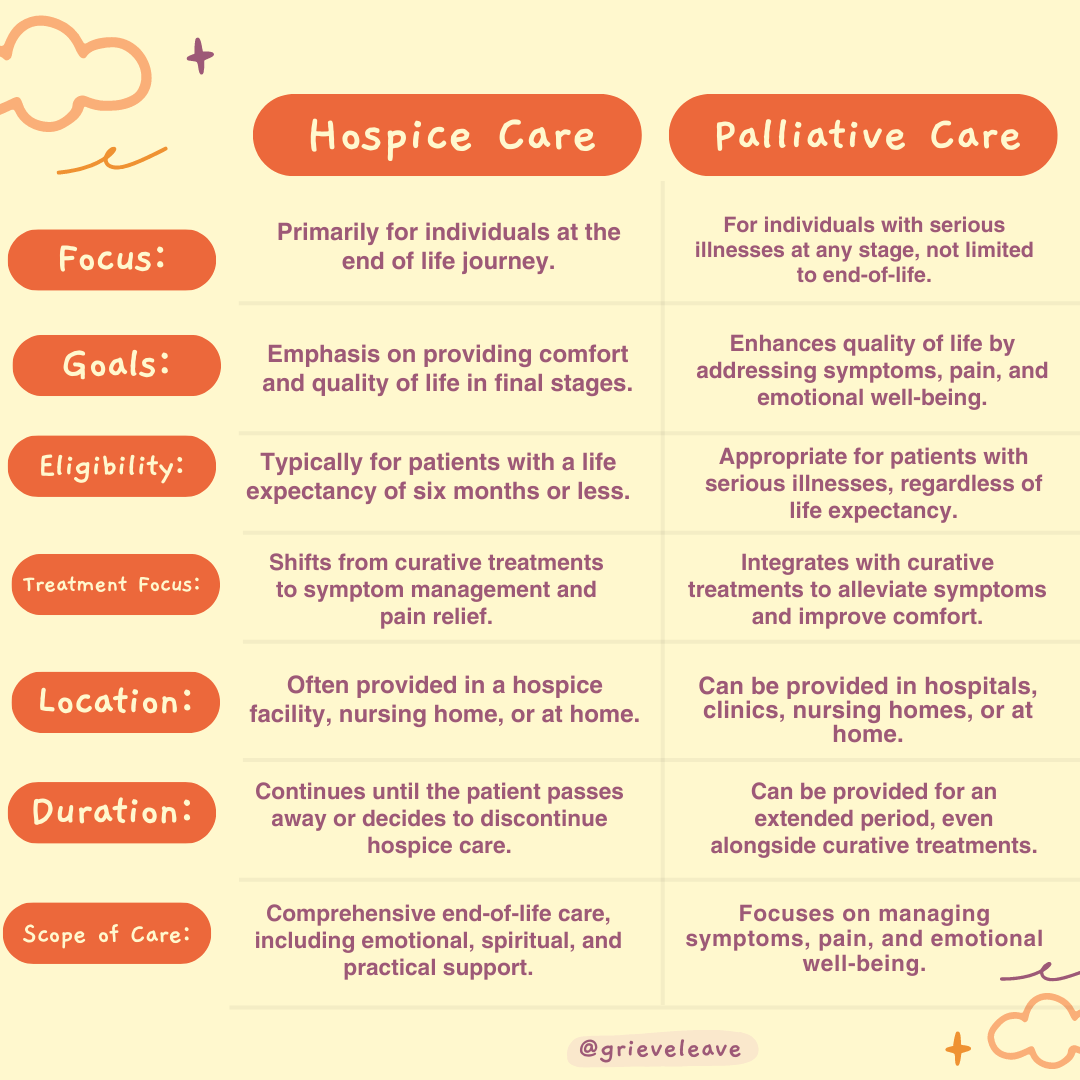Grief Guide: Hospice vs. Palliative Care with Karen Bullock
Aug 13, 2023Here at Grieve Leave, we know that caring for a sick or dying loved one is HARD. And managing the logistics of their care, on top of recognizing our own grief? Well, that might feel impossible, sometimes. Our goal is to support one another in our grief and bring you helpful information to better to understand what logistics that might come alongside loss.
When we think about end-of-life care for our loved ones, two important concepts — hospice care and palliative care — come to the forefront. But, what’s the difference? While hospice and palliative care aim to enhance the well-being and comfort of individuals facing serious illnesses, they serve distinct purposes. So let’s break it down!
During a recent interview with Dr. Karen Bullock — an endowed professor of social work at Boston College whose focus is on cancer care, social support for older adults with serious illness, and health equity — Grieve Leave founder, Rebecca Feinglos, asked Karen to help us better understand the distinction AND the cultural considerations we must take into account for caretakers and families.
Watch a clip from our insightful interview with Karen above, and read our Grief Guide on Hospice vs. Palliative Care below to better understand the different roles of the two care options, and hopefully leave feeling more equipped and reassured to navigate these processes now or the future.
Anticipatory Grief:
Before we delve into the differences between hospice and palliative care, it's important to address a significant emotional aspect of end-of-life care: anticipatory grief. Grief can begin before the death of a loved one, and we might feel it as our person ages, or becomes progressively more ill. It’s the feeling of little losses along the way (such as cognitive ability) or simply understanding that death is coming, eventually. Anticipatory grief involves a complex mix of feelings such as sadness, anxiety, guilt, anger, and even relief. All of these feelings are normal and okay, and if you’d like to learn more about this type of grief, read our blog post here.
Hospice Care: Embracing Comfort and Dignity
Hospice care might be a scary term for some, but it is a compassionate and specialized approach dedicated to enveloping people with terminal illnesses in a comprehensive support as they are nearing the end of their lives. At its heart, hospice care seeks to uplift quality of life during these final stages, emphasizing alleviating pain, managing symptoms, and nurturing emotional well-being. Hospice care may look different depending on where the care is given. This is a conversation many have with their families to see if they have the resources to provide this treatment at home, or if it can be provided at a designated facility. Hospice care ensures that a caring assembly of medical experts and caregivers are readily available to support each patient who needs end-of-life care.
Palliative Care: Enhancing Quality of Life
Palliative care( which can be used interchangeably with “hospice care”) is a broader concept that aims to enhance the overall quality of life for individuals facing serious illnesses — regardless of whether at the end of life or seeking curative treatments. Palliative care is similar to hospice care in that both aim to relieve pain symptoms and act as a lever of support to help through the emotional toll of the illness. Overall, palliative care offers the level of care we wish to provide our loved ones, while sometimes paired with curative treatments. The benefit of this approach is the level of flexibility and variety of treatment plans.
Patients and families can sit down together to plan with their healthcare provider to find the option that makes the most sense for their situation and feel reassured throughout this process. End-of-life care is tough. Patients deserve to have access to a treatment plan that makes sense for their specific needs.

Navigating care for a sick or dying loved one is hard, especially when we become painfully aware that they are nearing the end of life. Providing ourselves with the tools and resources to navigate specialized care can support our loved one’s comfort and wellbeing, and allows us to support them AND ourselves better.
Join the Grieve Leave movement
Share your info to join our Grieve Leave community. You don’t want to miss anything!


